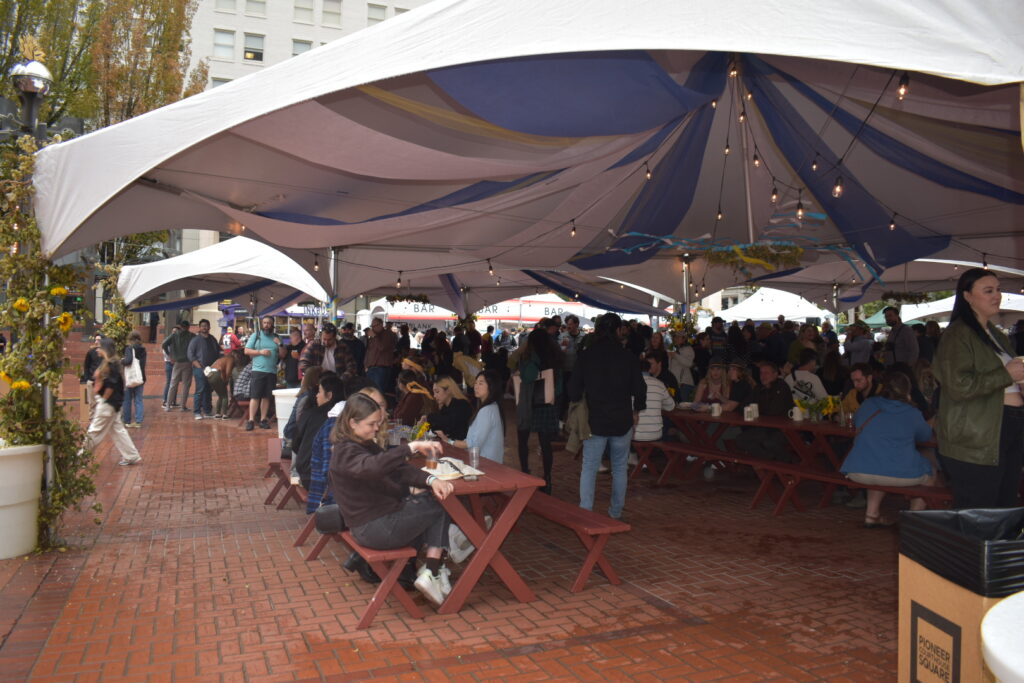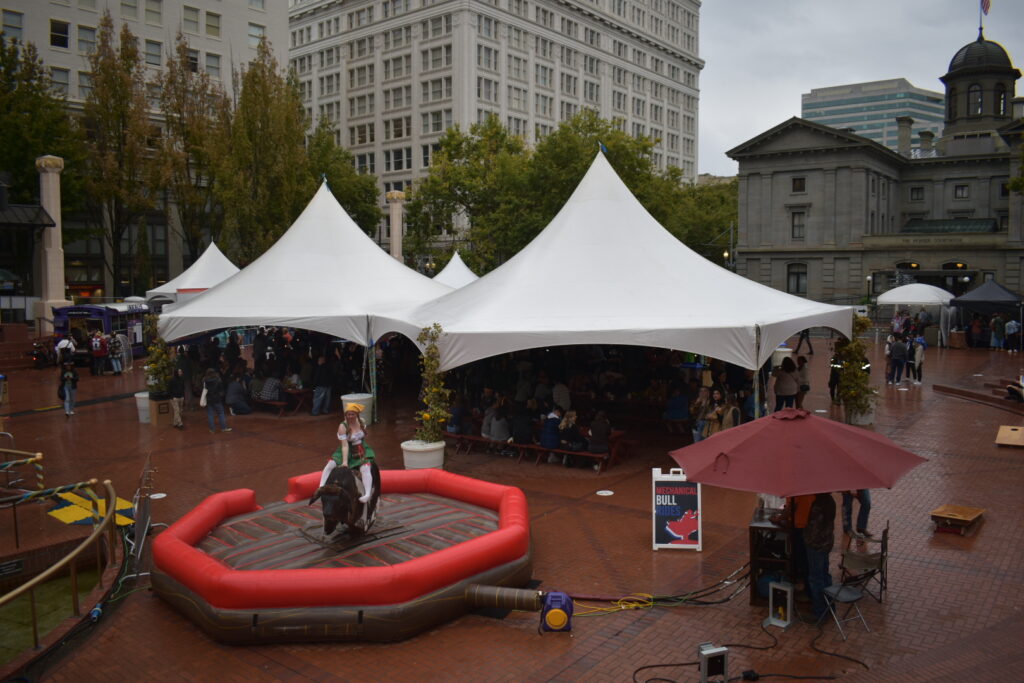On Sept. 22 and 23, Pioneer Courthouse Square hosted the Portland Oktoberfest, a 21+ event celebrating the 213 year old Bavarian festival. Portland Oktoberfest was advertised as combining the Bavarian tradition of Oktoberfest with Portland’s eccentric flair. This blend of tradition and novelty held true, with about 10% of attendees wearing “Tracht,” traditional Bavarian clothing, including “Lederhosen” and “Dirndlkleids,” and the other 90% rocking the usual Portland fashion.
General admission tickets cost $18 online and $25 in person, which included two drink tickets. For $10 more, visitors could receive a 20 ounce commemorative beer “Stein,” the traditional serving vessel at Oktoberfest. For those who wished not to drink, entry was $10 both online and in person.
Upon entry, one could sense the classic Oktoberfest feel, with blue-and-white decorated tents as homage to the traditional Bavarian flag colors, and, of course, lots of beer. While the event served traditional Bavarian food such as sausages and pretzels, Portland brought its own signature style to Oktoberfest by stationing various food trucks on the edges of the square.
The first thing visitors saw when entering Pioneer Courthouse Square was a giant mechanical bull, replacing the traditional carnival rides and games in Munich. One bold participant wearing “Lederhosen” and rainbow suspenders braved the bull but fell off in under a minute while drag queens meandered around the tents and interacted with visitors. Evidently, Portland has succeeded in making Oktoberfest uniquely its own.
“[It is] an incredibly chaotic Portland farmer’s market with some German influence,” Annika Valkonen ’24 said.
The tradition of Oktoberfest began in Munich to celebrate the marriage of Ludwig I, the crown prince of the German state of Bavaria, to Princess Therese von Sachsen-Hildburghausen. The celebration of the marriage lasted five days and ever since, folks from all over the world have journeyed to Munich year after year in pursuit of an enthusiastic jamboree, which now lasts 16 days. While the original purpose of the celebrations have since been lost in time, the excitement and dedication to Oktoberfest has remained strong.
In Munich, Oktoberfest usually begins with a parade in which proud Bavarians wearing their “Tracht” waltz down the street, followed by draft horses carrying barrels of beer to their respective breweries. Only the original six Munich breweries—Augustiner, Hacker-Pschorr, Hofbräu, Löwenbräu, Paulaner and Spaten—are allowed to serve beer at Oktoberfest, and each is served from a dedicated festival tent in its own custom one-liter tall Stein. In every tent, live musicians play songs ranging from Bavarian “Brassmusik” to American songs like “Take Me Home, Country Roads.”
While the Oktoberfest in Portland was much smaller than the main event in Munich, the two tents in Pioneer Courthouse Square not only gave that classic Oktoberfest feeling, but also provided shelter to the visitors who still showed up in the rain. There was also live music played by a band who gleefully shared East European music including Polka and a seven-minute rendition of “Rasputin.”
Ben O’Connell ’24 and Juliana Wullenjohn ’24 attended the event out of curiosity, as they both participated in the Year of Study in Munich program during the 2022-23 academic year. Wullenjohn went all out and even wore her “Dirndl,” which she bought in Munich for Oktoberfest last year. She had heard about the event through her grandmother, who reminded her that Oktoberfest had begun. Wullenjohn and O’Connell were both curious about how Portland’s Oktoberfest would compare to Oktoberfest in Munich.
“They got the loud music that you kind of have to yell to speak over. They did that right. You know I like some of the decor, they got the blue and white. But there are a lot less people in traditional wear and everyone is a lot more sober,” Wullenjohn said.
“Honestly, the main parts of Oktoberfest are drinking, music and more drinking and there is enough of that going on,” O’Connell said.
Both Wullenjohn and O’Connell reflected that while the event was much smaller and more tame than what they had experienced in Munich, it included the most important parts of the festival which reminded them of their time abroad. They both agreed that the serving of beer is the most important part of Oktoberfest and were pleased that a few of the six original Munich beers were served.
“I love that they imported beer. It was really nice to see some of my favorite ones from Munich on the menu when they are not able to be found in Fred Meyer or somewhere else,” Wullenjohn said.
O’Connell agreed, adding that drinking good, authentic German beer at this iconic festival was a pleasant surprise.
“They’ve got real Munich beer which isn’t totally easy to find in Portland, so that’s nice. You know, it kind of just takes me back to when I was at Oktoberfest. It brings me back to those days,” O’Connell said.
Even though the drink menu didn’t serve all six beers from the original German breweries, it made up for it by serving other Portland beers, wines and spirits which do not exist at Munich’s Oktoberfest, such as a grapefruit Radler.
Wullenjohn reflected that while the event was not exactly the same as it is in Munich, it was not at all disappointing.
“I do like this as a much more chill and much more affordable option in comparison to flying to Germany and buying their 13 euro liter of beer,” Wullenjohn said.
Portland was able to make something new and fun out of a tradition that has lasted over 200 years.
Subscribe to the Mossy Log Newsletter
Stay up to date with the goings-on at Lewis & Clark! Get the top stories or your favorite section delivered to your inbox whenever we release a new issue.



Leave a Reply